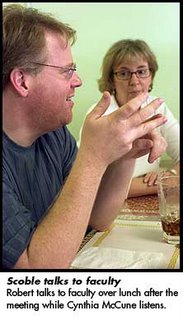And remember how the shit hit the fan when it came out that Gov. Arnold Schwarzenegger was putting out VNRs that looked like real news to promote one of his reform programs? (See related article in SF Chronicle and discussion on KPBS.)
Well, apparently the U.S. military has not been paying attention. Otherwise, they would have anticipated the blowback they're now getting about the fake news stories they've been planting in the Iraqi news media.
It seems this "secret" operation, conducted by the military's "information operations task force" with the help of a DC-based consulting firm known as the Lincoln Group, has been going on since early this year. (See the LA Times article that broke this story, and a follow-up by Reuters.)
Many are not pleased. Sen. John Warner, chairman of the Senate Armed Services Committee, quoted in the Washington Post, had this to say:
"I am concerned about any actions that may undermine the credibility of the United States as we help the Iraqi people stand up a democracy," said the committee's chairman, Sen. John Warner, R-Va., adding that he has no information to confirm or deny the reports. "A free and independent press is critical to the functioning of a democracy, and I am concerned about any actions which may erode the independence of the Iraqi media."
Is Warner right to be worried? Judge for yourself. Check out the coverage this story is getting worldwide in news outlets such as Arab News, KurdMedia, News24 (South Africa), and the New Zealand Herald.
Of course, not everyone thinks it's a problem. Take a look at this alternative view by a retired Air Force brigadier general and professor of defense studies, which appeared as an editorial in the LA Times.
Then check out this angry response on Richard Edelman's blog. (Yes, that Edelman...the president and CEO of the big public relations firm.)
This is utterly unacceptable behavior. In no way does this describe public relations. It is pay for play and a PR firm based in the US is doing it. Advertising and public relations are not the same thing. We don't do storyboards. We don't buy space. We don't pay journalists to be on our side. We don't fake out media by pretending that we don't know much about our client, working under cover of night. We don't say that there is only one side to a story. If a free media is a central aspect of a democratic society, then we cannot allow our PR industry to impede its development. It is a perversion of our business, an intentional blurring of a clear demarcation between paid and earned media. We should advise our clients, private sector and governmental, that trust is earned through transparency, continuous communication and dialogue.
You might also want to read Falling for Fake News, a good Poynter Online article about the "fake news" trend.
